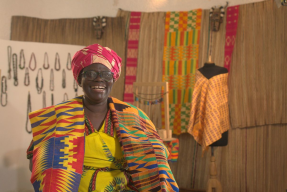By Cynthia McMurry, KF8, Ecuador
Everyday conversations with people in Cuenca provide countless anecdotes of people whose families have been separated by emigration. Everyone seems to have family in the US or Spain, if not a spouse then a brother, sister, cousin or child. At a group meeting last week, a borrower joked that she’d like me to sneak her into the US in my backpack. I asked her and the rest of the group if they had family members in the States, and all ten women nodded their heads in unison. Recently, I was chatting with a friend whose father is living in New York—she’s my age, and hasn’t seen her father in more than a decade. One of Espoir’s first Kiva clients, Nancy, has a four-year-old daughter who has never met her father, since Nancy’s husband left for Brooklyn when she was still pregnant. Another Espoir client I spoke with has been raising her four young children alone since her husband left for New York two years ago. Now, thanks to the economic crisis, he has lost both of his jobs and remains heavily in debt to a coyote. With no hope of financial support from her husband coming anytime soon, this client has been left to provide for her four children on her own.
Somewhere between 10% and 15% of Ecuadorians live abroad, most in the New York metro area, where they are one of the largest immigrant groups, and in Spain, where they are the second largest immigrant group. As of 2006, nearly 8% of Ecuador’s GDP was comprised of remittances, compared with about 3% for Mexico (International Fund for Agricultural Development).
The high rate of migration has troubling implications for Ecuadorian families. On top of the obvious consequences of emigration, like separated couples and absent fathers, many of the men who leave start new families in the US or Europe and eventually stop sending remittances to their families in Ecuador, leaving their wives to fend for themselves as single mothers. In other cases, men emigrate with their wives or send for their wives later, and children are left with their grandparents or with neighbors. Because many Ecuadorians in the US are there illegally, they have no possibilities to return to visit, and sending for their families would mean paying more exorbitant coyote fees for the dangerous 2500-mile trip. Coyotes typically charge between $12,000 and $14,000 per person. This is about three times the average annual income in Ecuador, the equivalent of $135,000 for a US citizen. And paying this fee doesn’t guarantee that you’ll actually make it into the country: somewhere between 1,000 and 2,000 Ecuadorians are apprehended each year trying to enter the US illegally (Migration Information Source). Many of these people have already sold off their houses, livestock, and any other valuables they may have in their hometowns, just to be sent back home with a new mountain of debt and even fewer possibilities than before.

Pedro, one of Espoir's loan officers, playing with his son
I haven’t asked borrowers whether it’s worth it, but I’m curious. Do the economic opportunities available abroad justify the separation of their families? How are their children affected? If they could go back in time, would they make the same choices?
I’m interested in hearing other fellows’ experiences with emigration and its effects on borrowers’ lives, both positive and negative. Where does microfinance fit into the picture? Are clients using remittances to pay off their loan installments? Or are their small businesses the only means of support they have for their families ever since the remittance payments stopped? For those of you working in the US, have you met any Ecuadorian immigrants looking to take out Kiva loans? If so, is their ultimate goal to save money and return home, or have they established themselves in the US?
To search for currently fundraising Espoir loans on Kiva, click here. No currently fundraising clients? Please check back soon! In the meantime, you can join Espoir’s Kiva Lending Team here.
Cynthia McMurry is a fourth-time Kiva fellow working with brand new Kiva field partner Fundación Espoir in Cuenca, Ecuador. Previously she worked with Fundación AgroCapital in Bolivia and FINCA Peru and Asociación Arariwa in Peru.
/>PREVIOUS ARTICLE
Community Conference Call Roundup - June 2009 →NEXT ARTICLE
Microfinance through New-York-Colored Glasses →













